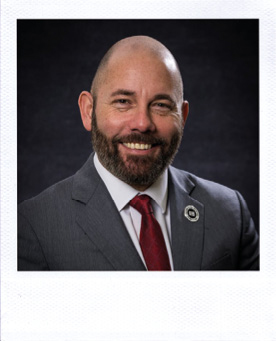 THE SECURITY PROVIDER’S VIEW
THE SECURITY PROVIDER’S VIEW
CHRIS MIDDLETON,
DIRECTOR OF MAJOR ACCOUNTS, CORPS SECURITY
A recent study from The University of Portsmouth (2020) found that four in 10 security officers in the UK are suffering Post Traumatic Stress Disorder (PTSD), due to verbal and physical abuse. Almost 40 per cent of those surveyed exhibit symptoms of PTSD. This research is so alarming it raises serious concerns about whether enough is being done when it comes to supporting security personnel with mental health related issues. The UK Security Industry Authority (SIA) currently has over 400,000 licenced security personnel throughout the UK so the impact cannot be underestimated. Are companies taking this seriously, or just ticking boxes?
Many companies have an outsourced employee assistance programme (EAP) for their staff to access 24/7. Corps Security’s EAP includes access to a six-week counselling course so if officers have gone through particularly stressful or traumatic incidents, they have professionals to speak to. We also offer Aviva Digicare+, which gives employees access to doctor’s appointments, annual health checks, nutrition consultations and gym discounts, so they can protect their physical and mental health.
Collaboration between security managers and HR teams is crucial. Security officers should always feel supported especially where they are lone working. Officers should know there is always someone they can reach out to if they need additional support, a space to be heard, or to seek advice and relevant resources.
Security organisations need to actively take steps to understand the differing needs of their officers and what might be beneficial for them. Disability confidence and neurodiversity training, for example, can raise awareness of disabled and neurodiverse employees’ needs and how to spot signs of struggle.
Many companies have invested in appointing mental health first aiders, to help identify people that are potentially suffering with mental health issues and be able to sign post to the correct support resources and services. These are relatively new measures for many companies and the uptake can be slow. In some cases, the success of these initiatives is still being measured.
In my opinion, given the prevalence of mental health challenges in the security industry, support needs to be far more widespread than individual company initiatives. The security industry needs to work to tackle alarming statistics and address the stigma around mental health.
Corps Security has launched the Wellness Baton, an event series collaborating with other security and FM providers. These events allow City Security Council members to come together and share best practice while learning from expert mental health speakers. There have been four Wellness Baton events held by different security providers since Corps’ initial Mental Health event which kicked off this important industry initiative in May 2023. Other sector wide initiatives include Security Minds Matter, a campaign that includes a wide variety of subject matter experts leading a new mental health in security strategy for 2024 and beyond.
It is initiatives like these that will be essential for the industry to make a difference. Security providers need to deliver sustained support to maintain momentum and drive long term change that improves health and wellbeing in the industry.





